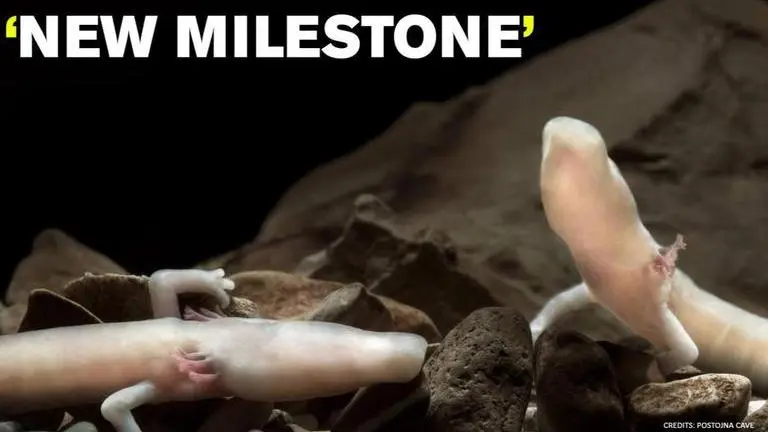Updated 13 July 2020 at 11:47 IST
'Baby dragons' in Slovenia's Postojna Cave go on display for the first time ever
‘Baby dragons’ has been captivating people’s imagination for centuries and recently the Postojna Cave announced that the animals will be going on display.
- World News
- 3 min read

The ‘unusual’ appearance of Olms or ‘baby dragons’ has been captivating people’s imagination for centuries and recently the Postojna Cave, where researcher have been raising them for years, announced that the ancient salamander creatures will be going on display for the first time. According to the official website of Postojna Cave, the authorities are allowing up to 30 visitors per day to come and check out the animals in a new tour called the ‘Meet the Baby Dragons'.
The baby olms were born back in 2016. One of the female olms had laid 64 eggs inside an aquarium in the cave and 22 babies were hatched. The ‘baby dragons’ had been cave’s ‘best kept and most carefully guarded secret’, however, after four years and ‘for the first time ever’, one can now meet the animals ‘face to face’ from June 13 onwards.
The Postojna cave, while calling it VIP tour wrote, “Postojna Cave's baby dragons have left their nest. From now on, you can meet them ‘face to face’. As part of the experience, you will tour Postojna Cave and meet three of the twenty-one baby olms that have so far been living in a cave laboratory”.
Advertisement
The ‘baby dragons’ have spent the past four years hidden away and only been seen by those working at the cave’s lab, however, now cave officials are allowing visitors meet the ‘unusual’ animals. Margin Batagelj, Postojna Cave’s managing director reportedly said that the opening of a new aquarium with three baby olms marks a ‘new milestone’ both for the olms and for the Slovenian cave. Batagelj informed that for centuries, the cave has been considering the cradle of paleobiology and the world’s number one cave in terms of biodiversity. He further also called the opening up of the aquarium for visitors ‘an extraordinary achievement’.
‘Largest cave predators’
Pale, almost translucent, unusual red tuffs, eyes nowhere to be seen and four limbs, the bizarre-looking creatures can live up to 100 years and spend their entire lives underwater. ‘Baby dragons’ have long snake-like bodies and their length of 25-30 centimetres makes them one of the largest cave predators. They move around the water snake-like by twisting of their bodies, assisted by the legs.
Advertisement
The Postojna cave informed, “They breathe with external gills and rudimentary lungs. Although adult olms have no eyes, they can "see" everything with the help of skin receptors. They are very good at sensing their prey and their skin is also very sensitive to light. They can go without food for up to twelve years and have a lifespan of up to 100 years”.
Published By : Bhavya Sukheja
Published On: 13 July 2020 at 11:47 IST
